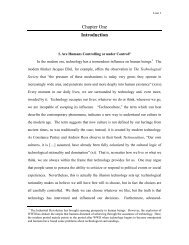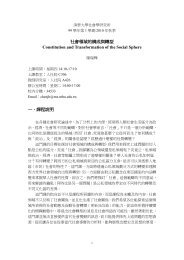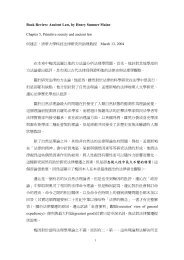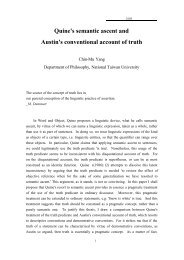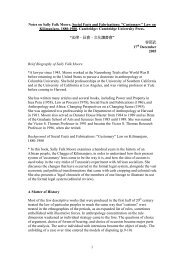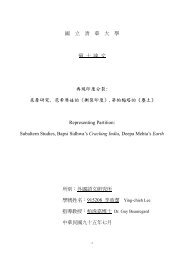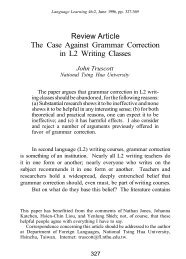Effects of Graded Texts on EFL College Students' Incidental ...
Effects of Graded Texts on EFL College Students' Incidental ...
Effects of Graded Texts on EFL College Students' Incidental ...
You also want an ePaper? Increase the reach of your titles
YUMPU automatically turns print PDFs into web optimized ePapers that Google loves.
learners’ processing <str<strong>on</strong>g>of</str<strong>on</strong>g> texts was presumably meaning-based. Hence, <strong>on</strong>ly when<br />
word meaning is not available at the time <str<strong>on</strong>g>of</str<strong>on</strong>g> use will learners take into account<br />
surrounding c<strong>on</strong>texts <str<strong>on</strong>g>of</str<strong>on</strong>g> target words and deeper analyses <str<strong>on</strong>g>of</str<strong>on</strong>g> target words c<strong>on</strong>textual<br />
cues be processed. As was indicated by Wesche and Paribakht (2000), in the c<strong>on</strong>text<br />
<str<strong>on</strong>g>of</str<strong>on</strong>g> extensive reading “<strong>on</strong>ce the immediate communicative need has been met, the<br />
learner does not undertake future mental processing <str<strong>on</strong>g>of</str<strong>on</strong>g> the word” (p. 197). The gloss<br />
originally incorporated for ensuring correct target word meaning, though suggested by<br />
previous studies as being beneficial to word learning, attenuated the possibility <str<strong>on</strong>g>of</str<strong>on</strong>g><br />
learners’ deeper mental processing.<br />
A dilemma was posed here in that preciseness <str<strong>on</strong>g>of</str<strong>on</strong>g> word meaning and depth <str<strong>on</strong>g>of</str<strong>on</strong>g><br />
processing were both desired. It could be that more exposure al<strong>on</strong>g the reading<br />
process might be able to mend learners’ superficial acquisiti<strong>on</strong>s at initial stages.<br />
However, as was found in the current study, the amount <str<strong>on</strong>g>of</str<strong>on</strong>g> exposure for receptive and<br />
productive knowledge should be greater than at least 15 times in an extensive reading<br />
c<strong>on</strong>text. Whether learners have ample enough opportunities for such an amount <str<strong>on</strong>g>of</str<strong>on</strong>g><br />
encounter and whether the vocabulary pay<str<strong>on</strong>g>of</str<strong>on</strong>g>f in extensive reading is suitable in <strong>EFL</strong><br />
c<strong>on</strong>text are still in questi<strong>on</strong>. Thus, a more promising alternative for quality<br />
vocabulary acquisiti<strong>on</strong> might be to use a combinati<strong>on</strong> <str<strong>on</strong>g>of</str<strong>on</strong>g> explicit vocabulary<br />
instructi<strong>on</strong> and implicit extensive reading. Positive evidence was found for the use<br />
<str<strong>on</strong>g>of</str<strong>on</strong>g> explicit vocabulary instructi<strong>on</strong> in c<strong>on</strong>juncti<strong>on</strong> with extensive reading (Paribakht<br />
and Weshche, 1997; Quan, 1996), indicating the benefits <str<strong>on</strong>g>of</str<strong>on</strong>g> certain degree <str<strong>on</strong>g>of</str<strong>on</strong>g> teacher<br />
interventi<strong>on</strong> in sec<strong>on</strong>d language vocabulary teaching.<br />
Nati<strong>on</strong> (1990) proposed that the intrinsic difficulty <str<strong>on</strong>g>of</str<strong>on</strong>g> words could be a<br />
possibility underlying the ease <str<strong>on</strong>g>of</str<strong>on</strong>g> word acquisiti<strong>on</strong>. The results in the current study<br />
seem to dem<strong>on</strong>strate such effect with learners needing more than an amount <str<strong>on</strong>g>of</str<strong>on</strong>g> 15<br />
exposure <strong>on</strong> the ten target words mainly found in the most difficult band <str<strong>on</strong>g>of</str<strong>on</strong>g> the<br />
78



